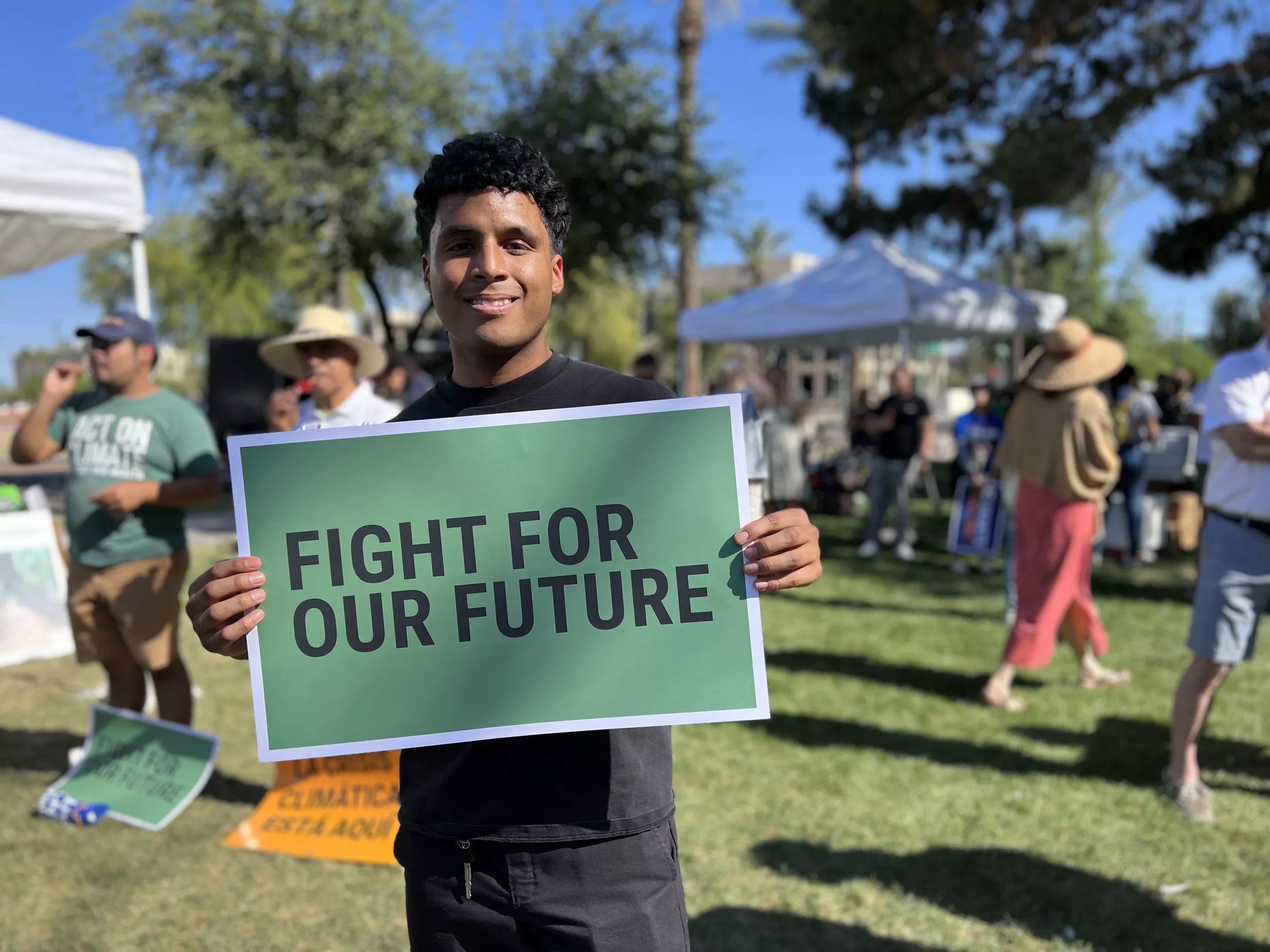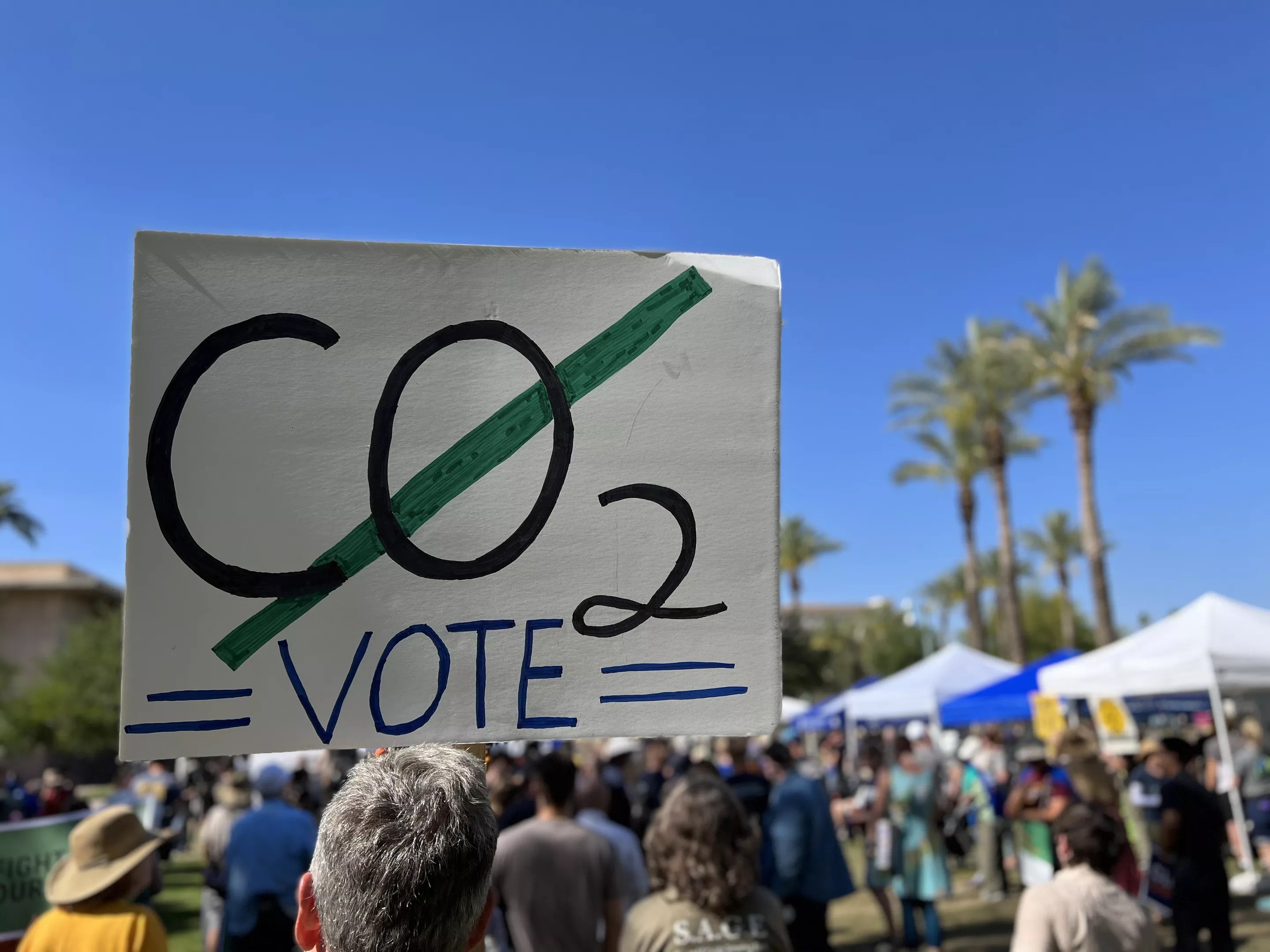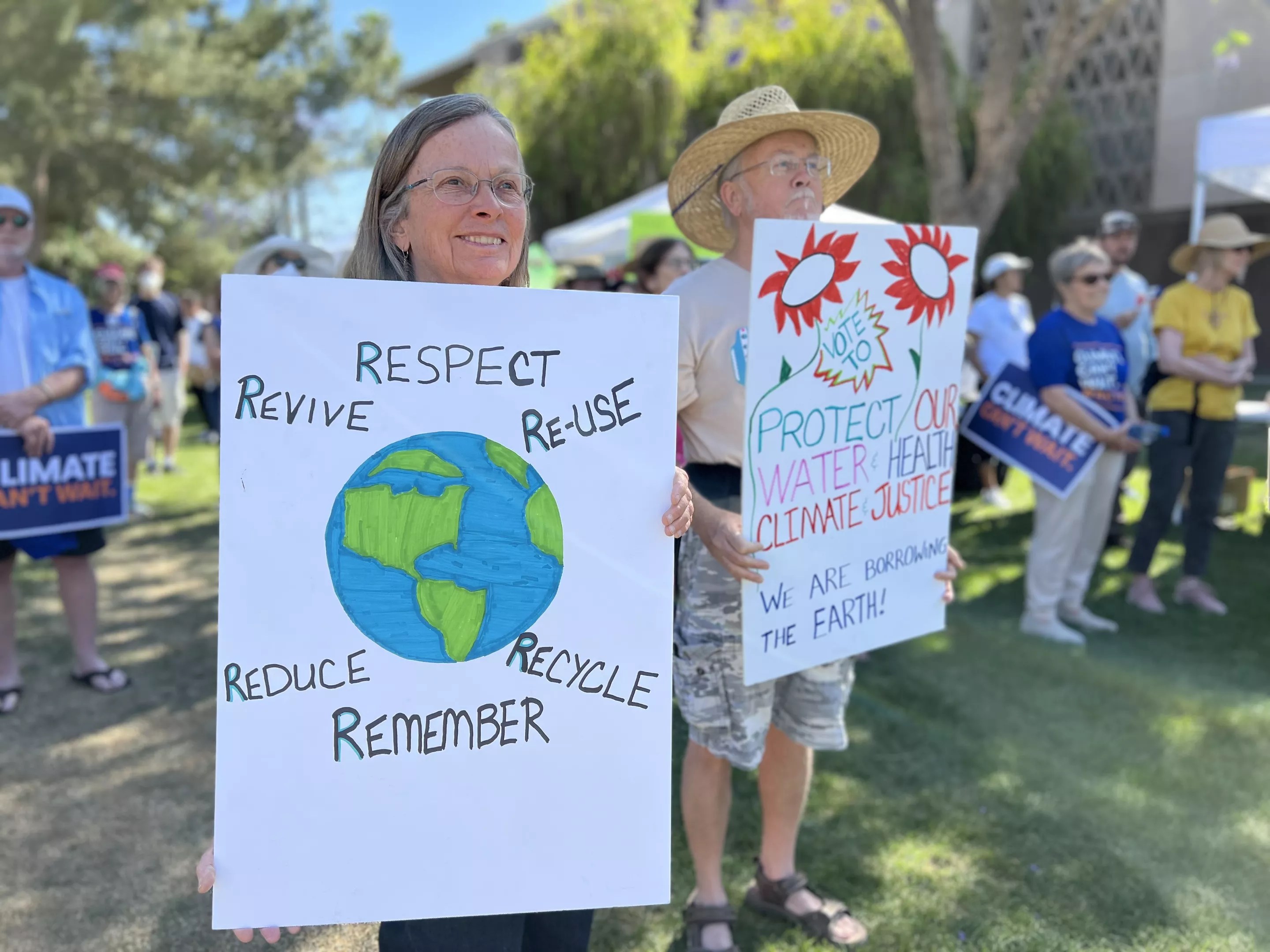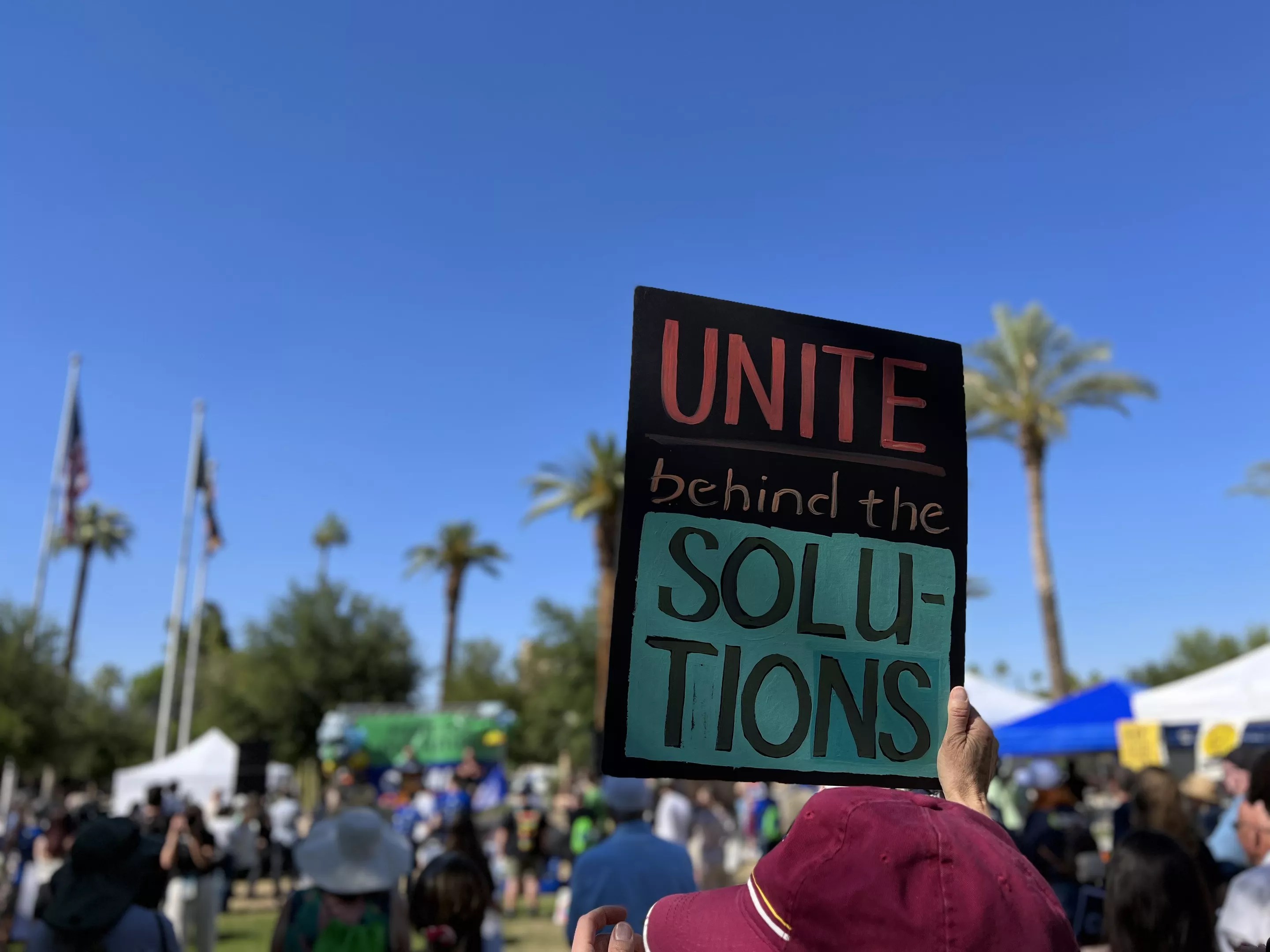
Elias Weiss

Audio By Carbonatix
As the drought gripping Arizona reached its driest point in more than a millennium, hundreds of people at the Arizona Capitol Lawn on Saturday afternoon were engulfed in a sea of signs reading, “Climate can’t wait.”
Protesters united behind the fear that, without investing in an ambitious climate policy by Memorial Day, much of Arizona might soon be uninhabitable.
They’re asking for a second chance at the Build Back Better Act, an omnibus spending bill that died in the U.S. Senate early this year.
The grassroots, nationwide push starts here in Arizona.
Sick of waiting for federal action after President Joe Biden’s euphuistic social spending plan sputtered out in February, green panthers looked to turn heads in Washington toward Phoenix.
“Arizona is ground zero for the climate crisis,” said Hazel Chandler, who heads the Phoenix chapter of Washington, D.C.-based environmental advocacy nonprofit Moms Clean Air Force.
“If we don’t make drastic changes within the next eight years, there’s real doubt about how livable Arizona is going to be,” Chandler told Phoenix New Times on Friday.
A broad coalition of more than 20 environmental groups, labor unions, civil rights organizations, and youth activists packed the lawn in front of the Arizona Capitol for the “Fight for Our Future” event Saturday, the day after Earth Day.
The group pleaded with U.S. Senators Mark Kelly and Kyrsten Sinema to pass bold climate-focused legislation as Congress prepared to return Monday from recess.
“We’re running out of time,” Angelica Zamora, political manager of Arizona Green New Deal, told New Times on Friday. “We have a small window of time to get this done. Democrats are hoping for the best but preparing for the worst.”
Zamora represents one piece of the Washington, D.C.-based Green New Deal Network, a progressive nonprofit caucus that helped organize this weekend’s nationwide Earth Day mobilization in 40 American cities, with Washington, Phoenix, Los Angeles, and Chicago at the forefront.
She and other activists worry that, after Memorial Day, Washington’s focus will shift to the upcoming primaries and midterm elections when Republicans could regain a majority in Congress.
“Arizona is at the epicenter of the climate crisis,” Zamora said, because “there is chatter about Arizona becoming uninhabitable in the next 15 years.”

A 5 billion injection into federal climate programs, a key piece of the social spending package and “the largest effort to combat climate change in American history,” would curb CO2 emissions, the leading gas causing global warming.
Elias Weiss
Build Back Better … Again
The coalition points the finger at Sinema and Senator Joe Manchin, a Democrat from West Virginia, for being “too moderate” and responsible for sabotaging the Build Back Better Act. The bill was once labeled by the Biden White House as one of “the most transformative” social spending packages in American history.
The two Democrats pulled their support of Biden’s sweeping social safety net expansion and voted along with each of the 50 Senate Republicans.
At the time, Sinema called it “a promise I can’t deliver,” citing concerns about inflation and its dire toll on the American economy – especially in Phoenix, where rates of inflation are higher than in any other city in the country.
Manchin said in December he “cannot vote” for the bill because of inflation and mounting federal debt.
“I’ve never found out that you can lower costs by spending more,” the third-term senator told Washington, D.C. newspaper The Hill in March.
With total Democratic support, the Build Back Better Act would have passed, with Vice President Kamala Harris breaking the tie on a 50-50 party-line vote.
Now, two months after the bill died, the coalition is begging the senators to take action.
“We’re targeting them, not collaborating with them,” said Kayla Gaines, a spokesperson for the Green New Deal Network who flew in from Washington and spoke with New Times on the evening before the demonstration.
“Build Back Better wasn’t successful because large corporations definitely put money into these elected officials’ pockets,” said Zamora, the leader of the Green New Deal Network’s Arizona chapter.
Sinema, a first-term senator, took $750,000 in donations from pharmaceutical companies before voting against a bill that would lower prescription drug costs, despite repeatedly vowing on the 2018 campaign trail to fight for affordable drug prices.
Sinema did not respond to interview requests from New Times.
The 2,500-page Build Back Better bill could have called for more than $10 trillion in spending over the next decade. That number was whittled down to just $1.7 trillion over 10 years before lawmakers snuffed the bill, including a major slash to the $555 billion earmarked for climate programs.
But activists argue that passing the Build Back Better Act could save more than $14 trillion on climate issues alone.
A 2018 analysis from the Washington, D.C.-based American Geophysical Union found the annual gross domestic product losses of climate inaction – the difference between the potential and actual values of all a country’s goods and services – would cost the U.S. nearly $700 billion every year. That’s up from an average of $200 billion every year since 2015.
According to an October report from the National Oceanic and Atmospheric Administration, 2021 was on pace to be one of the costliest years for extreme weather disasters in American history.
Every second, extreme weather and natural disasters create $4,700 in damages in the United States. If the Build Back Better Act were to pass, experts at the rally predicted that number would drop to $1,700 per second.
“The cost of inaction is not comparable to the cost of action,” said Chandler, the 76-year-old activist who wrote in a 1968 article that fossil fuels would cause a climate problem in her lifetime. “It’s way cheaper to invest in things that are going to mitigate this crisis than it is to continue to fork out money year after year to fix damages from extreme weather events.”
A second swing at the Build Back Better Act would need to be funded by “taxing billionaires,” Zamora said. She added, “All of that money could be going into these bold climate investments.”
Early in her tenure, Sinema was vocal in her opposition to raising the corporate tax rate by even a single percentage point. She refused to budge even after her fellow Senate Democrats spent weeks trying to bring her around.
That’s why more than 400 climate activists threw down the gauntlet against Sinema this weekend as they slurped down popsicles and huddled under tents to escape the heat of the already scorching, late-spring Arizona sun.

More than 400 climate activists rallied behind U.S. Representative Raúl M. Grijalva, a Tucson Democrat, in Phoenix on Saturday.
Elias Weiss
Climate Woes
That sun is only making Phoenix hotter.
Nearly 500 people died of heat-related illnesses in Arizona in 2020, a record number of deaths following the hottest summer ever measured.
More than 300 deaths were linked to overheating in Maricopa County that year.
That’s a primary concern for U.S. Representative Raúl M. Grijalva, a Democrat from Tucson and chairman of the House Natural Resources Committee, who championed Saturday’s climate rally.
Grijalva helped pass the Build Back Better Act in the House before it died in the Senate.
“The natural disasters we see around us – drought, heat, poverty, disease – that affects us today,” Grijalva said at Saturday’s event. “It is important to begin grappling with social justice and equity in climate change.”
Two wildfires continue to burn more than 23,000 of acres of forest near Prescott and Flagstaff, remaining mostly uncontained after several days and forcing thousands of Arizonans to evacuate their homes.
During fire events, air quality in some West Coast cities in the U.S. has vitiated to a quality poorer than the most polluted Chinese cities.
That empowered Democrats to take minor action.
On April 19, the White House Council on Environmental Quality announced it would begin requiring federal agencies to evaluate the climate impact of infrastructure projects like pipelines and roads, an about-face from former President Donald Trump’s weakening of the National Environmental Policy Act.
Grijalva called Trump’s changes to NEPA “egregiously wrong.” But for Sinema, his colleague in the Senate chamber next door, the move creates more red tape and ups spending.
Her opinion, shared with Manchin, helped quell the Democratic micro-majority that would have brought Build Back Better to fruition.
The coalition that protested in Phoenix on Saturday, however, believes an amended Build Back Better Act can still realistically pass before Election Day.
“If we can’t get it done in D.C., we’re going to get it done in every state,” Gaines said. “This is a national push and Arizona is a major part of that push.”

Activists are begging Kyrsten Sinema, the U.S. Senator from Arizona, to help reintroduce and pass President Joe Boden’s Build Back Better Act before Memorial Day.
Elias Weiss
Sonja Klinsky, an associate professor at Arizona State University’s Global Institute of Sustainability and Innovation, warned that Washington needs to start taking climate change “deadly seriously” if Arizona is to remain inhabitable for future generations.
She has been researching the dangers of a warming planet since 1996.
“Back then, if I went to a protest about climate change, I’d be the only one there,” Klinsky said.
Arizona State University student volunteers met at 91st Avenue and Broadway Road in Phoenix the morning of the rally to clean up the Salt River.
Local efforts are not enough, Klinsky said.
As Biden grapples with low approval ratings in the face of unprecedented inflation and exponential hikes in fuel prices, environmental security is becoming “an afterthought to all the other issues we’re facing,” she said.
Exacerbated by American intervention in Ukraine as it wards off a Russian invasion, Biden’s lack of action on climate issues is jeopardizing the faith of young voters who turned out “in record numbers” to the polls in 2020 to secure Democratic control of Congress.
Half the number of voters aged 18-29 cast ballots in 2020, up from 39 percent in 2016, according to the Center for Information and Research on Civic Learning and Engagement at Tufts University near Boston.
In an effort to curb rising gasoline prices, Biden last week tabled his climate agenda and loosened environmental restrictions to allow fossil fuels to flow freely from the pumps in Arizona and across the country.
The president released a record amount of oil from the Strategic Petroleum Reserve in Texas and Louisiana, and pledged to increase oil drilling on public lands despite promising his constituents while on the 2020 campaign trail that they wouldn’t see any new oil and gas extraction operations.
Young voters in Arizona are ready to turn their backs on Biden.
“Civilizations are on the brink of collapse,” Tempe youth climate activist Saiarchana Darira told the crowd of more than 400 in a prepared speech Saturday. “Phoenix included.”
Speaking at an Earth Day event in Seattle, Biden blamed Republicans for derailing his green agenda.
And the U.S. Supreme Court is slated to rule on a case soon that would nix Biden’s ability to place sanctions on manufacturers and motorists to smother greenhouse pollution.
Biden stands by the Build Back Better Act in the face of bipartisan opposition.
Ironically, opponents of the legislation likened it to a weather disaster.
“The Senate should kill this bill and pour salt in the sand on its burial site so it never comes back,” The Hill columnist Stephen Moore wrote in November, the month when the House passed it by a 220-213 vote. “More debt, spending and printing of money at this stage of our economic recovery would be the equivalent of pouring gasoline on an inflation forest fire.”